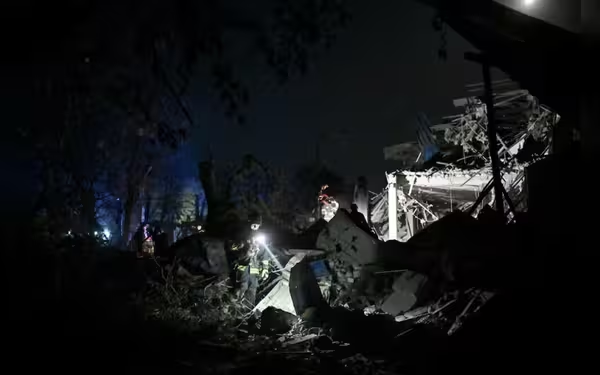Saturday, November 16, 2024 07:31 PM
Russian Missile Strike Kills Reuters Safety Adviser in Kramatorsk
- Ryan Evans killed in missile strike on Sapphire Hotel.
- Ukrainian officials investigate potential targeting of journalists.
- Russian claims about Evans' ties to intelligence denied by Reuters.
 Image Credits: brecorder
Image Credits: brecorderA missile strike in Kramatorsk killed Reuters safety adviser Ryan Evans, raising concerns over journalist safety amid ongoing conflict.
In a tragic incident that underscores the ongoing conflict in Ukraine, Russian forces have been implicated in the missile strike that resulted in the death of Ryan Evans, a safety adviser for Reuters. This attack, which occurred on August 24, targeted the Sapphire Hotel in Kramatorsk, where Evans and his colleagues were staying. The missile, identified as a Russian Iskander 9M723 ballistic missile, was reportedly launched from a location near Taganrog, a city in Russia close to the Ukrainian border.
According to Ukrainian intelligence sources, two Russian military units were operating in the vicinity of the launch site at the time of the attack. The Ukrainian military's general staff indicated that the missile struck the hotel just seven minutes after its launch, highlighting the precision of the Iskander missile system, which is known for its accuracy within 30 meters of its intended target.
Despite the missile's precision, there remains uncertainty regarding the targeting of the hotel. Ukrainian officials have stated that they have no evidence suggesting that the Sapphire Hotel was specifically designated as a target by Russian forces. Kremlin spokesman Dmitry Peskov reiterated that Russian military operations are aimed solely at military infrastructure, leaving many questions unanswered about the circumstances surrounding the attack.
The aftermath of the strike was devastating. Ryan Evans, a 38-year-old former British soldier, was killed instantly, while two other journalists from Reuters sustained serious injuries. The scene was chaotic, with debris scattered throughout the hotel, and the remaining members of the team narrowly escaped with minor injuries. Eyewitness accounts describe a scene of destruction, with one photographer recalling, "The whole room was full of rubble and glass and dust. The wall with the door had completely caved in." This vivid description paints a picture of the horror experienced by those present during the attack.
In the wake of the incident, Ukrainian authorities have launched an investigation to determine whether the hotel was deliberately targeted. The Donetsk region prosecutor's office is exploring the possibility that Russian forces aimed at the group of journalists, raising serious concerns about the safety of media personnel in conflict zones.
Adding to the complexity of the situation, Russian officials have made unfounded claims regarding Evans' background, suggesting he had ties to British intelligence. Reuters has firmly denied these allegations, emphasizing their commitment to journalistic integrity and independence.
This incident serves as a stark reminder of the dangers faced by journalists covering conflicts around the world. As the situation in Ukraine continues to evolve, the need for accurate reporting and the protection of media personnel remains paramount. The international community must remain vigilant in advocating for the safety of journalists, ensuring that they can carry out their vital work without fear of violence or retribution.
The missile strike on the Sapphire Hotel not only claimed the life of a dedicated journalist but also highlighted the broader implications of warfare on civilian life and the media's role in documenting these events. As we reflect on this tragedy, it is crucial to support efforts that promote the safety of journalists and uphold the principles of free and independent reporting in the face of adversity.













